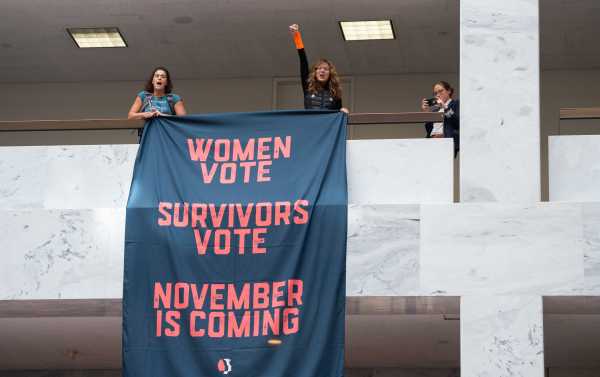
Everybody wants to know if the Brett Kavanaugh Supreme Court confirmation drama will help Republicans or Democrats in the 2018 midterm elections. The truth is, based on the polls we have, it’s really hard to tell.
The narrative goes something like this: Republican voters have been energized by the partisan fight over Kavanaugh’s nomination and the sexual assault allegations against him. They view it as an unfair Democratic smear campaign against a good man. So those voters — particularly the Trump skeptics who might otherwise not have felt a compulsion to vote in November — will now turn out to support Republicans. Small-dollar fundraising is booming for the GOP, we learned Thursday, which only strengthens that interpretation.
But the polling evidence is more complicated, and the Kavanaugh effect could be contradictory. Republicans might be improving their odds of keeping the Senate, where the GOP base will be crucial — several vulnerable Democrats are up for reelection in states that Trump won in 2016 and where he still remains popular. But the Supreme Court fight might not help as much in the House elections, where suburban swing districts — and swing voters, women in particular — will decide who controls the chamber.
What the Kavanaugh fight means for the 2018 House elections
FiveThirtyEight’s Nate Silver thoroughly explored this question, and his analysis is worth reading in full. Here is his conclusion:
Two FiveThirtyEight tables tell the story pretty simply. First off, in the House:
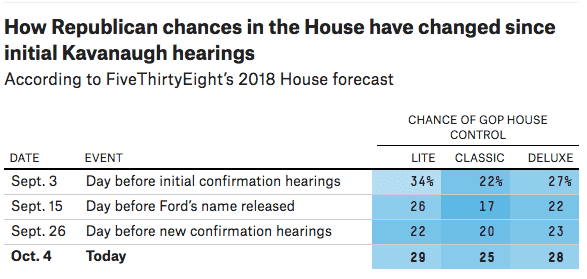
FiveThirtyEight uses a few different formulas to come up with its odds for House control — one forecast uses only polls, while the others account for additional factors like Congress’s approval rating — but there is a consistent narrative across all three. Before Kavanaugh’s first Senate confirmation hearing (and before the assault allegations became public), the GOP had about a one-in-four chance of holding the House. That remains true today. The metrics moved a little bit in response to new developments, but only by a couple points.
The generic congressional ballot shows the same trends — or lack thereof. On September 19, just a couple days after Ford’s story became public, Democrats held an average 8.4-point lead in the generic ballot, according to RealClearPolitics, roughly what experts think they need to win the House. As of October 3, they still had a 7.7-point lead.
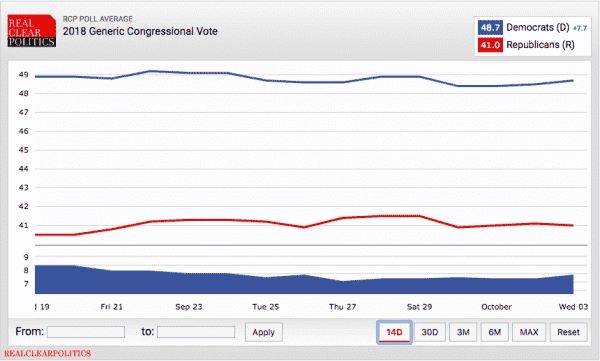
So Democrats have seen a very slight dip in their generic ballot lead, but it’s hard to treat that as conclusive or to attribute it directly to Kavanaugh. The generic ballot has fluctuated throughout the year.
What the Kavanaugh fight means for the 2018 Senate elections
When you look at the Senate, though, Republicans do seem to be gaining ground. Here is the second FiveThirtyEight chart that tells the story of Kavanaugh and the midterms:
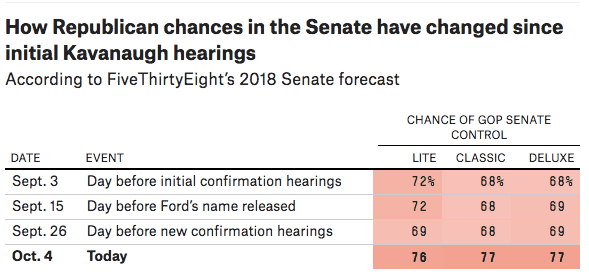
Especially if you look at the forecasts that incorporate variables besides raw horse-race polling, the GOP has materially improved its position. They are today 9 points more likely to hold the Senate than they were before Kavanaugh’s confirmation hearing.
To intentionally cherry-pick some additional data points, Democratic Sen. Heidi Heitkamp (D-ND) has trailed by 10 and 12 points in the two surveys taken since the Kavanaugh drama began. She had been trailing by low single digits.
In the only post-allegations poll of the Tennessee Senate race, thought to be an unexpected Democratic pick-up opportunity in a deep-red state, the Republican nominee, Rep. Marsha Blackburn (R-TN), led Democrat Phil Bredesen by 5 points, when Bredesen had previously been holding a slim advantage.
The dissonance between the House and the Senate might seem confusing. But it’s actually quite simple.
The Senate elections are being fought in pretty red states, where conservative voter turnout may be decisive. This new Republican energy is therefore good for the GOP in those races.
The House elections, on the other hand, might be more determined by swing voters in suburban districts (particularly independent and Republican-leaning women) who aren’t so easily excited by the partisan food fight. The nature of the allegation and President Donald Trump’s mocking of Christine Blasey Ford could also hurt Republicans in those races and with those voters.
What the Kavanaugh fight means for voter enthusiasm
So that looks like the story of the horse race: The Kavanaugh fight might be helping Republicans in the Senate while making little difference in the House, where Democrats remain cautious favorites. But the other outstanding question is about voter enthusiasm: Is the contentious confirmation process going to motivate Republicans and erase what until now seemed to be a Democratic energy advantage?
Once again, the evidence is mixed. It doesn’t lend itself to an easy narrative.
This NPR/PBS NewsHour/Marist poll attracted a lot of attention for showing Republicans catching up on enthusiasm. In July, 78 percent of Democrats said the 2018 midterms were “very important” while 68 percent of Republicans said the same. But now, the two parties are almost even: 82 percent of Democrats say the midterms are very important, as do 80 percent of Republicans.
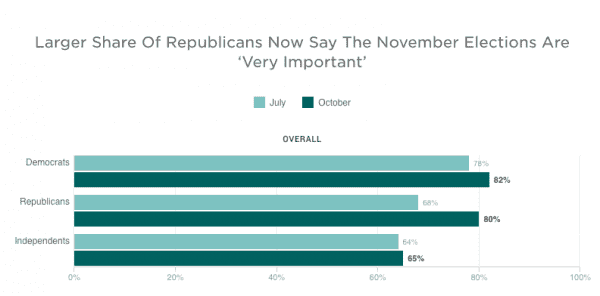
For Democrats, that has to be the single-most worrying survey finding of the past few weeks and, for Republicans, the most encouraging.
But it is still just one data point in a sea of public opinion surveys. Others are less definitive. Gallup, for example, found little changed from June to a late September poll taken the days after Ford’s story was first reported. In June, 56 percent of voters said they were certain to vote in November. In late September, 58 percent of voters said they were certain to vote, a negligible change.
Gallup has also looked at enthusiasm by party and, especially if you take the long view, 2018 is still defined by a historic surge in Democratic enthusiasm. Republicans, meanwhile, are more engaged than they were in the comparatively placid 2014 elections — but not quite as hyped as they were in the 2010 midterms when the GOP won back the House.
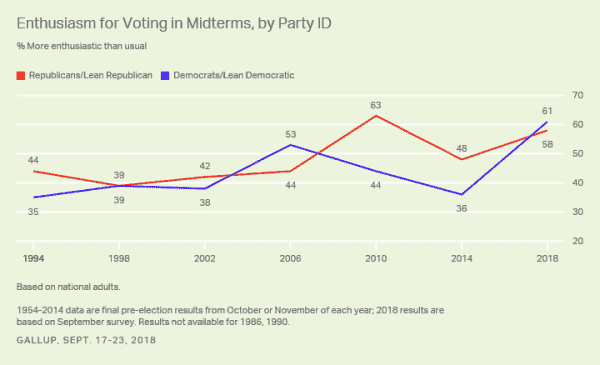
If you really want to geek out, polling nerds recommend watching the generic ballot, any decipherable change in likely voter screens (i.e., which voters say they will almost certainly vote), and even in self-reported party identification. But the sum of the evidence is mostly a wash; at best, you could argue Republicans are solidifying their advantage in the Senate but have seen little to improve their odds in the House.
There is one other variable to consider, though: How both party’s voters react after Kavanaugh’s confirmation (or rejection) in the Senate. This has been an ongoing story, and these polls were taken in the heat of the moment. Other issues and other stories are likely to take over the national conversation in the coming weeks before the midterms.
But setting that aside, a CBS News/YouGov poll suggests that whichever party loses the Kavanaugh confirmation fight might actually see an electoral benefit.
- If Kavanaugh is confirmed, 19 percent of voters said they’d feel enthusiastic, 29 percent said they’d feel satisfied, 26 percent said they’d feel dissatisfied, and 25 percent said they would feel angry
- If Kavanaugh is rejected, 13 percent of voters said they’d feel enthusiastic, 42 percent said they’d feel satisfied, 22 percent said they’d feel dissatisfied, and 23 percent said they would feel angry
The point being, a substantial portion of voters are going to be angry, far more than would be overly excited — and anger is as strong a motivator for voting as any. As the University of Delaware already reported earlier this year, anger and anxiety are strong drivers for voters in the midterms.
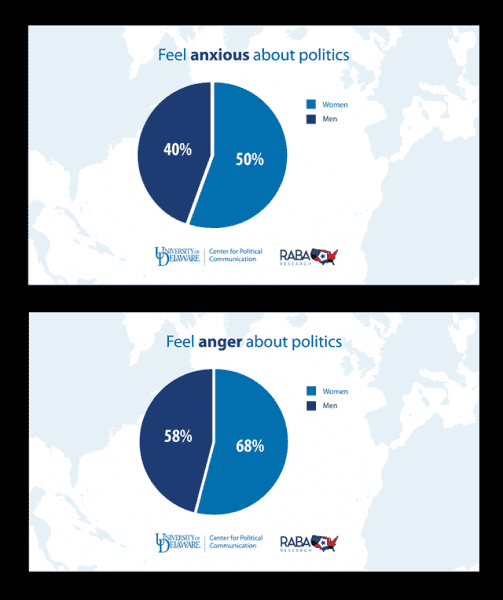
In the end, the midterms are likely to be determined, as much as anything, by how Americans broadly feel about President Trump. That has been the rule for midterm elections for decades, and a polarizing president makes it only more true.
But the Kavanaugh allegations and accompanying Senate drama, and their corresponding effect on voters, has added a new wrinkle, mere weeks before Election Day.
Sourse: vox.com






